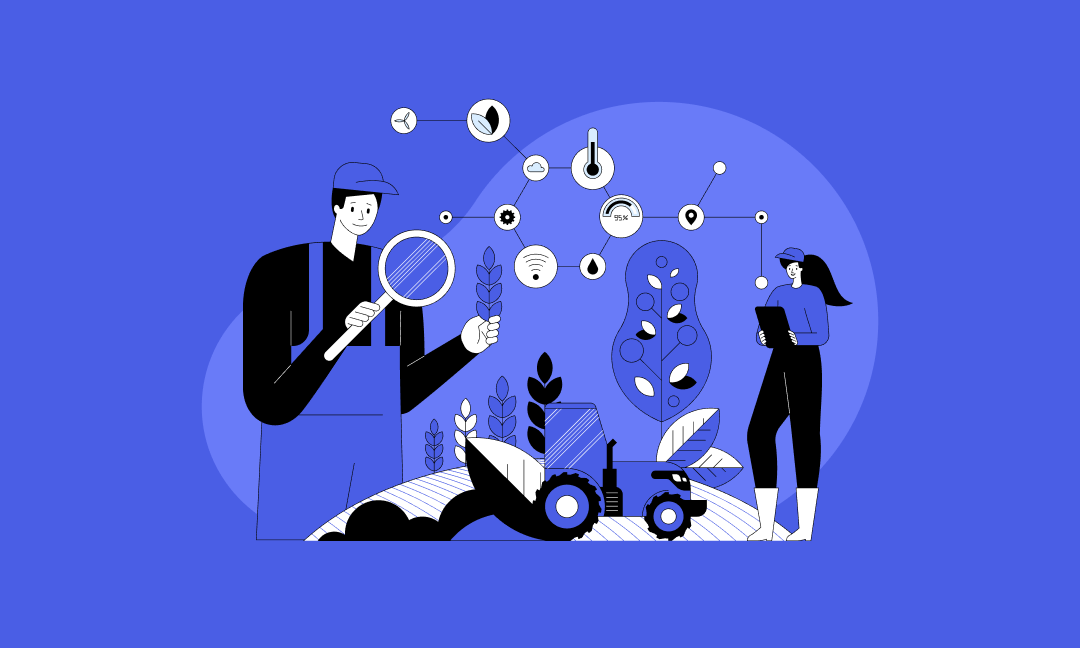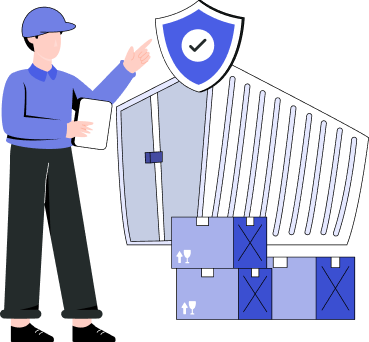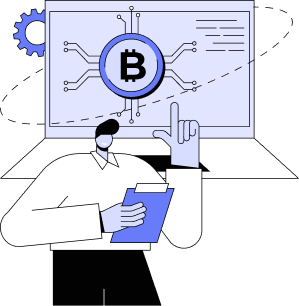- Benefits of Blockchain in Agriculture
- Reduced Operational Costs
- Increased Farmer Empowerment
- Enhanced Consumer Confidence
- Improved Inventory Management
- Sustainable Practices Verification
- Use Cases of Blockchain In Agriculture
- Traceability in Supply Chain
- Food Safety and Compliance
- Smart Contracts for Automatic Payments
- Access to Financial Services
- Quality Assurance and Certification
- Streamlining Supply Chain Management
- Challenges of Adopting Blockchain in the Agriculture and Food Industry
- The Future of Blockchain in Agriculture and Food Sector: What Businesses Can Expect
- Widespread Adoption Across the Supply Chain
- Integration with IoT and AI
- Enhanced Regulatory Compliance
- New Business Models and Revenue Streams
- Greater Consumer Engagement
- Why Appinventiv is the Right Partner for Leveraging Blockchain in Agriculture
- FAQs
The food and agriculture sectors are on the brink of a technological revolution, and blockchain is at the forefront of this transformation. With the global population growing daily, these industries are under increasing pressure to produce more efficiently and transparently. Now, blockchain, an immutable ledger, is the technology poised to significantly impact how businesses track, manage, and ensure the integrity of agricultural and food products.
Blockchain can assist the agricultural and food sectors in dealing with and managing predictable dangers and maintain affordability throughout the ecosystem. Below are some facts that state the use of blockchain in agriculture and its forecast in the coming years.
Adopting blockchain isn’t just about improving existing systems but also revolutionizing them. Blockchain’s ability to create a secure, immutable record of transactions makes it perfect for tracing the origins and journey of food products from the farm to the consumer’s table. This means involving parties like farmers, distributors, retailers, and consumers, all can have greater confidence in the quality and safety of the food they produce, sell, and eat.
According to Statistics, the global market value of blockchain in the food industry and agriculture sector is projected to reach a valuation of $1.5 billion by 2026. This growth is fueled by the increasing demand for transparency across the supply chain and the need for more secure, traceable food sources.
As businesses in these industries adapt to meet modern demands, blockchain stands out as a technology that can bridge the gap between traditional farming practices and high-tech solutions. Its adoption across these sectors is growing, driven by the need for more efficient supply chains and enhanced consumer trust.
In this blog, we will explore the pivotal role of blockchain in agriculture and food industries. From improving the transparency of the supply chain to enhancing food safety by providing a tamper-proof record of product history, let’s witness how blockchain holds promising potential for revolutionizing these sectors.
In practical terms, blockchain in farming allows everyone involved in the agricultural supply chain to access the same information in real-time. For instance, a farmer can enter details about crop yields or livestock health, and this data becomes immediately available to suppliers, regulators, and consumers. This level of transparency builds trust because everyone knows what’s happening at every stage.
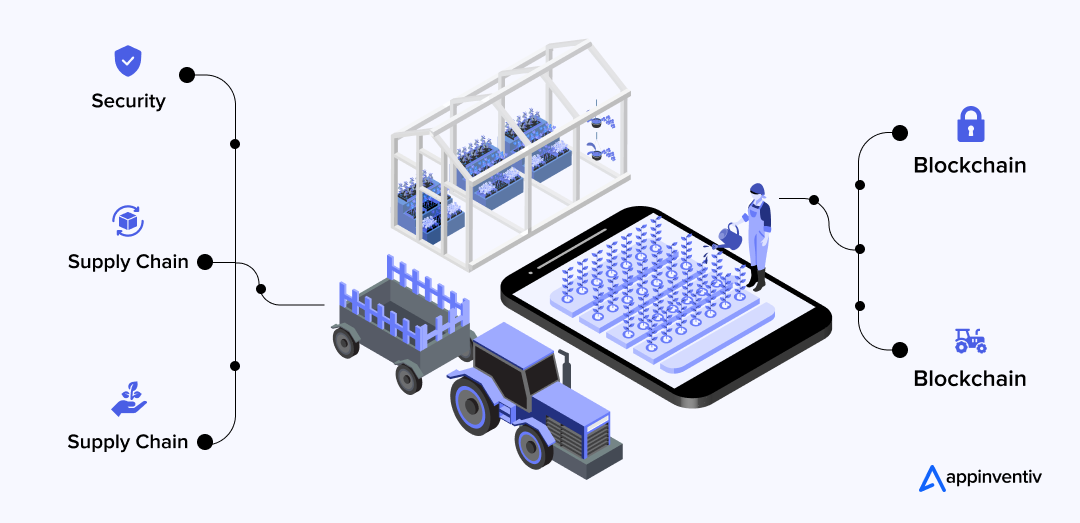
Moreover, blockchain can automate many processes through what are called smart contracts. These are self-executing contracts with the terms directly written into code. For example, a smart contract could automatically pay a farmer without paperwork when a delivery is confirmed. This reduces the time and potential for transaction error, making the agricultural sector more efficient and reliable.
Simply put, blockchain in the agriculture and food supply chain market is becoming more popular because it helps make farming and food selling better and safer. With blockchain, everyone from the farmer to the shopper can check that the food is good and comes from where it says it does. This makes things more open and honest and helps everyone trust the food they buy and eat. As more people use this technology, it will change how we grow and sell food, making the process smoother and more trustworthy.
Benefits of Blockchain in Agriculture
Blockchain technology is revolutionizing the agricultural sector by enhancing various operational aspects. Here are some key benefits that blockchain brings to agriculture:
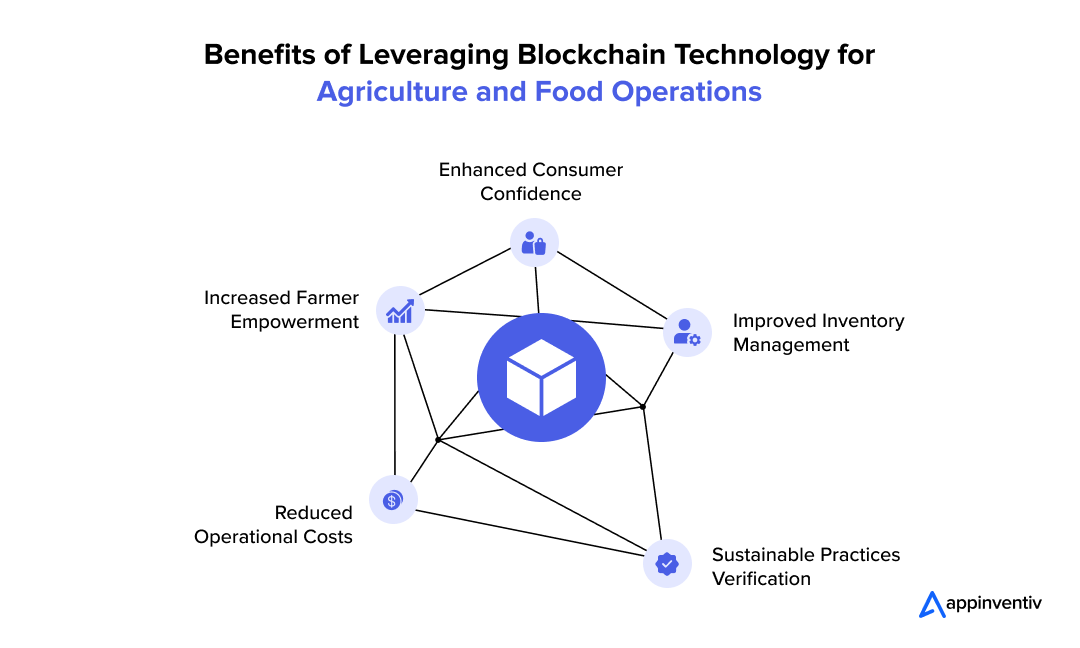
Reduced Operational Costs
Blockchain streamlines many processes within the agriculture supply chain, reducing the need for intermediaries. This can significantly lower transaction and operational costs.
Increased Farmer Empowerment
By providing a transparent system, agriculture blockchain solutions empower farmers by giving them more control over their products and the supply chain, helping them make better-informed decisions.
Enhanced Consumer Confidence
Blockchain’s traceability features allow consumers to verify the authenticity and safety of their food purchases, increasing their trust and loyalty to brands.
Improved Inventory Management
With real-time tracking and data analytics, blockchain in the food sector enables more accurate inventory management, helping to match supply with demand more effectively and reducing wastage.
Sustainable Practices Verification
Blockchain for agriculture helps verify sustainable farming practices by securely recording data, which can prove compliance with environmental and ethical standards, appealing to eco-conscious consumers.
Use Cases of Blockchain In Agriculture
Agriculture blockchain solutions are increasingly used in the sector to enhance transparency, efficiency, and trust in the food supply chain. Here are some of the major use cases of blockchain in the agriculture and food industry that businesses need to know:
Traceability in Supply Chain
Blockchain provides end-to-end traceability in the food supply chain, enabling consumers and stakeholders to track the produce journey from farm to table. This ensures transparency and increases trust.
Example: Walmart has implemented blockchain to track the origin of over 25 products from 5 different suppliers. This system allows them to trace the source of goods in seconds, significantly enhancing food safety and reducing response times during recalls.
Food Safety and Compliance
Blockchain helps quickly trace the origin of contaminated products to manage recalls efficiently and address food safety breaches.
Example: Nestlé and Dole use blockchain to manage the traceability of their products, which helps in the quick recall of contaminated products, ensuring consumer safety.
Smart Contracts for Automatic Payments
Blockchain enables smart contracts, which are automated, self-executing contracts with the agreement terms directly written into lines of code.
Example: AgriDigital, an Australian company, uses blockchain-based smart contracts to automate transactions. They ensure that farmers receive immediate payment once the delivery terms are verified, reducing the risk of payment delays or defaults.
Access to Financial Services
Blockchain can provide farmers, especially those in developing countries, with proof of asset ownership and transaction history, which can be used to secure loans and financial services.
Example: East-West Seed, a Southeast Asian company, uses blockchain to enhance financial inclusion for smallholder farmers. The company leverages blockchain technology to securely document farmers’ production data and transaction histories. This documentation helps farmers prove their financial stability and creditworthiness to financial institutions, enabling them to access necessary loans and financial services more easily.
Quality Assurance and Certification
Blockchain in the agriculture market can verify and certify the quality of produce, such as organic or fair-trade compliance, throughout its journey, which is crucial for maintaining standards and consumer trust.
Example: Bumble Bee Foods uses blockchain technology to track the journey of yellowfin tuna from the Indonesian ocean to the store shelf, allowing consumers to check the origin and quality of the fish they buy.
Streamlining Supply Chain Management
Blockchain agriculture apps optimize supply chain processes by providing real-time data access to all parties involved, reducing inefficiencies, and improving resource management.
Example: Cargill has incorporated blockchain to track turkeys from farms to grocery stores. Customers can access detailed information about the production process via a code on the package, ensuring transparency and enhancing trust.
Challenges of Adopting Blockchain in the Agriculture and Food Industry
While blockchain in the food industry and the agriculture sector, offers significant advantages to businesses, its adoption comes with certain challenges. Let’s look at some of the key challenges and potential solutions to overcome these hurdles:
| Challenge | Solution |
|---|---|
| High Implementation Costs | Reducing initial costs through government subsidies and incentives can make the technology more accessible. |
| Complexity of Technology | Partnering with a dedicated blockchain app development firm can help businesses understand and integrate blockchain smoothly into their existing systems. |
| Lack of Technical Expertise | Training programs and workshops can equip farmers and stakeholders with the necessary skills to use blockchain effectively. |
| Data Privacy Concerns | Implementing robust security measures and clear data governance policies ensures that sensitive information is protected while using blockchain. |
| Interoperability with Existing Systems | Developing standardized protocols and APIs can facilitate blockchain integration with existing agricultural technologies. |
| Scalability Issues | Using more scalable blockchain frameworks and networks can address performance bottlenecks as the number of users grows. |
The Future of Blockchain in Agriculture and Food Sector: What Businesses Can Expect
As blockchain technology continues to evolve, its impact on the agriculture and food sectors is expected to deepen. Here’s what businesses can look forward to in the future of blockchain in these industries:
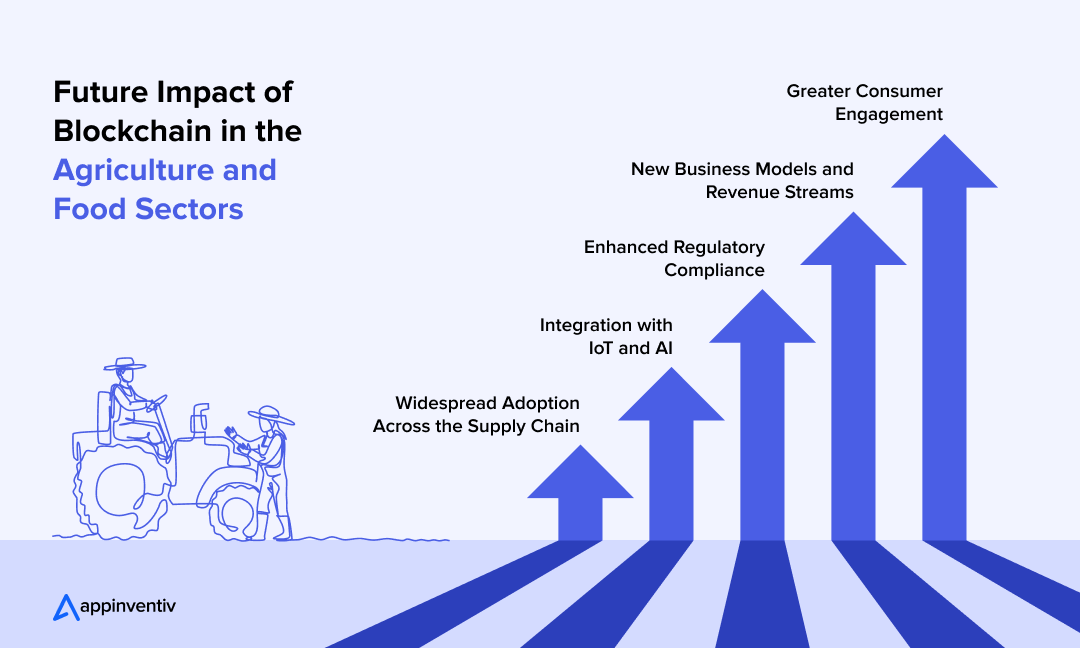
Widespread Adoption Across the Supply Chain
As blockchain proves its value in pilot projects, we can expect its adoption to become more widespread across the entire supply chain. This will enhance transparency, allowing all stakeholders, from farmers to consumers, to easily trace product origins and handle history.
Integration with IoT and AI
Blockchain agriculture apps will likely be increasingly integrated with other technologies like the Internet of Things and Artificial Intelligence. This convergence will enable more sophisticated data tracking and analysis, improving areas such as crop management, predictive harvest analytics, and automated compliance with food safety standards.
Enhanced Regulatory Compliance
As regulatory bodies worldwide continue to tighten food safety and traceability regulations, blockchain can become a standard tool for compliance. This will simplify proving provenance and handling practices, making audits smoother and less frequent.
New Business Models and Revenue Streams
Blockchain for agriculture opens up possibilities for new business models in the industry, such as peer-to-peer sales platforms, transparent marketplaces, and more direct interactions between producers and consumers. This could potentially disrupt traditional market dynamics and create new revenue opportunities.
Greater Consumer Engagement
With blockchain-framing solutions, consumers can have direct access to detailed information about the food they consume. This could lead to greater consumer engagement and loyalty as they can make more informed decisions based on sustainability practices, nutritional content, and more.
Why Appinventiv is the Right Partner for Leveraging Blockchain in Agriculture
We hope this blog has provided valuable insights into how blockchain technology can transform the agriculture and food sectors. As you consider implementing blockchain solutions for your business, partnering with a dedicated blockchain app development firm like Appinventiv becomes crucial. Here’s why we are your ideal development partner for integrating blockchain and agriculture:
Tailored Blockchain Services
We don’t just offer generic solutions but also specialize in crafting customized blockchain applications specifically designed to meet your agricultural business’s unique challenges and requirements. This bespoke approach ensures that the blockchain farming solution integrates seamlessly into your operations, maximizing efficiency and effectiveness.
Advanced Integration Capabilities
Understanding the complexity of agricultural supply chains, our experts excel in integrating blockchain technology with other critical systems and technologies, such as IoT devices and AI analytics. This integration capability enhances data collection and analysis, providing more accurate and actionable insights for your business.
Proven Expertise in Agri-tech Projects
With a robust portfolio of successful agri-tech projects, we have demonstrated our capability to innovate and deliver high-impact solutions. Being a dedicated agriculture software development company, our team of experts understands the nuances of the agriculture sector. It leverages this knowledge to provide solutions that meet and exceed client expectations.
For instance, our experts recently developed MAAN, an agriculture education-based interactive mobile app for the NMA nations. The app serves as a community hub where individuals passionate about nutrition and agriculture can connect, exchange ideas, and share articles, experiences, and insights.
Strong Focus on Scalability and Security
Recognizing the dynamic nature of the agriculture and food markets, we design blockchain apps that are secure against data breaches and scalable to accommodate growth. Whether you are a small producer or a large enterprise, our solutions evolve with your business.
Commitment to Regulatory Compliance
As a leading blockchain app development company, our experts ensure that all blockchain apps comply with the latest regulations and standards in the agriculture industry. This commitment reduces your legal risks and enhances consumer trust in your products.
Get in touch with us to reap the benefits of the transformative potential of blockchain technology in the agriculture market and position your business at the cutting edge of technology.
FAQs
Q. What is Blockchain in Agriculture?
A. Blockchain in agriculture refers to using blockchain technology to make farming and food production more transparent and efficient. Essentially, blockchain acts like a digital ledger that records every transaction or action in a way that cannot be changed or deleted. This helps ensure that every step in the food supply chain, from planting seeds to delivering produce to stores, is traceable and secure.
Q. How can blockchain be used in agriculture?
A. Blockchain for agriculture helps improve the transparency of the supply chain, from farm to table. This technology helps track the origin and journey of food products, ensuring that all handling and processing steps are recorded. This enhances food safety by allowing for quick recalls if necessary and also helps farmers get fair prices by directly providing proof of origin and quality to consumers and retailers.
Q. What are the challenges of blockchain in agriculture?
A. Blockchain in agriculture comes with challenges like high costs to start and complex technology that can be hard to understand. Rural areas might lack the needed tech infrastructure, making it tough to set up. Also, making different blockchain systems work together smoothly with old systems can be tricky, complicating how things are done in agriculture. Partnering with a dedicated app development firm can help businesses navigate the challenges associated with the integration of blockchain and agriculture while optimizing costs and ensuring smooth integration.
Q. How is blockchain technology helping farmers be more sustainable?
A. Blockchain technology helps farmers be more sustainable by enabling more efficient resource management and traceability. It provides a transparent platform to verify sustainable practices and ensures compliance with environmental standards. By securely documenting the production process, blockchain supports certifications like the product is organic or fair-trade, helping farmers gain market access and higher premiums for sustainability.


- In just 2 mins you will get a response
- Your idea is 100% protected by our Non Disclosure Agreement.
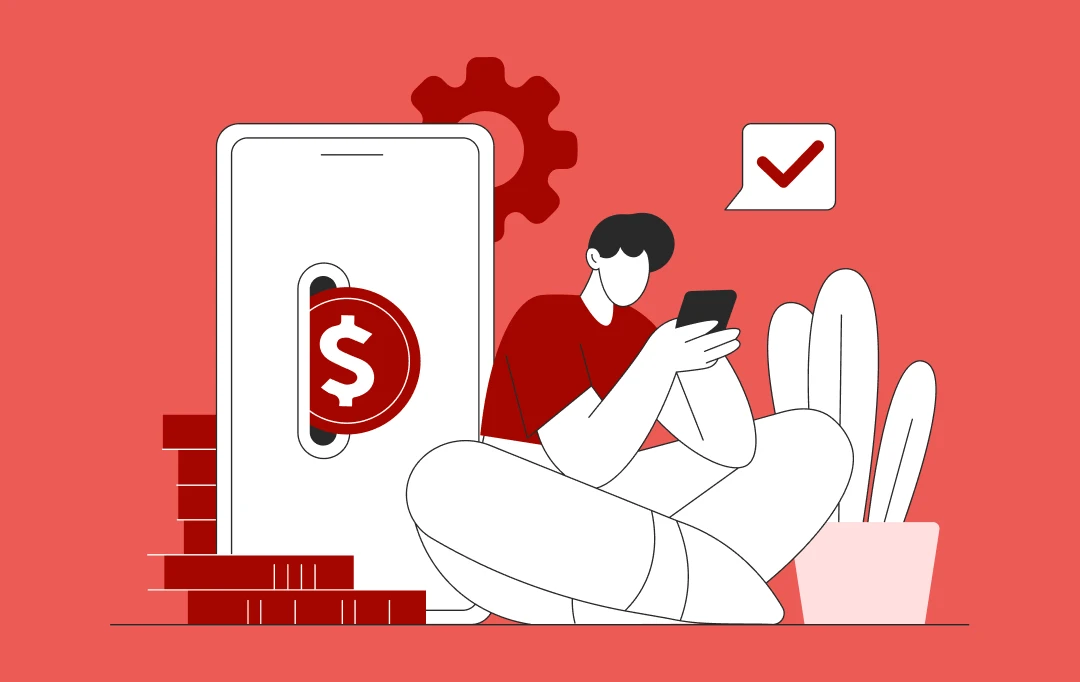
How Much Does It Cost to Develop a Crypto Wallet App Like Metamask?
Key takeaways: Developing a MetaMask-like crypto wallet can cost anywhere from $30,000 to $250,000+, depending on the complexity of features and integration. The cost breakdown includes development, security, integration with blockchain networks, and ongoing maintenance. A customized wallet opens up new revenue opportunities, brand differentiation, and long-term business growth. Since its launch in 2016, MetaMask…
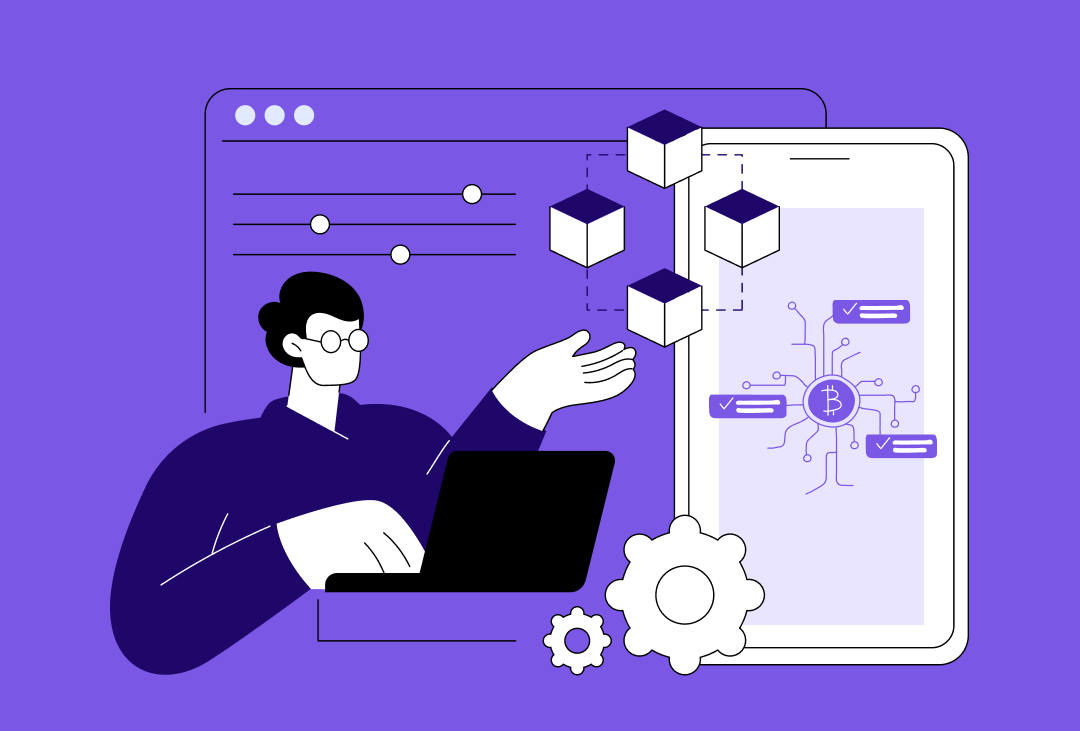
How Much Does it Cost to Build a Blockchain App in the UAE?
Key takeaways: The UAE blockchain market is rapidly expanding, with the BFSI sector capturing over 50% of the market share. As blockchain adoption accelerates, development costs in the UAE range from AED 55,000 to AED 1.85 million, depending on app complexity and features. Factors such as platform selection, security measures, and third-party integrations directly impact…
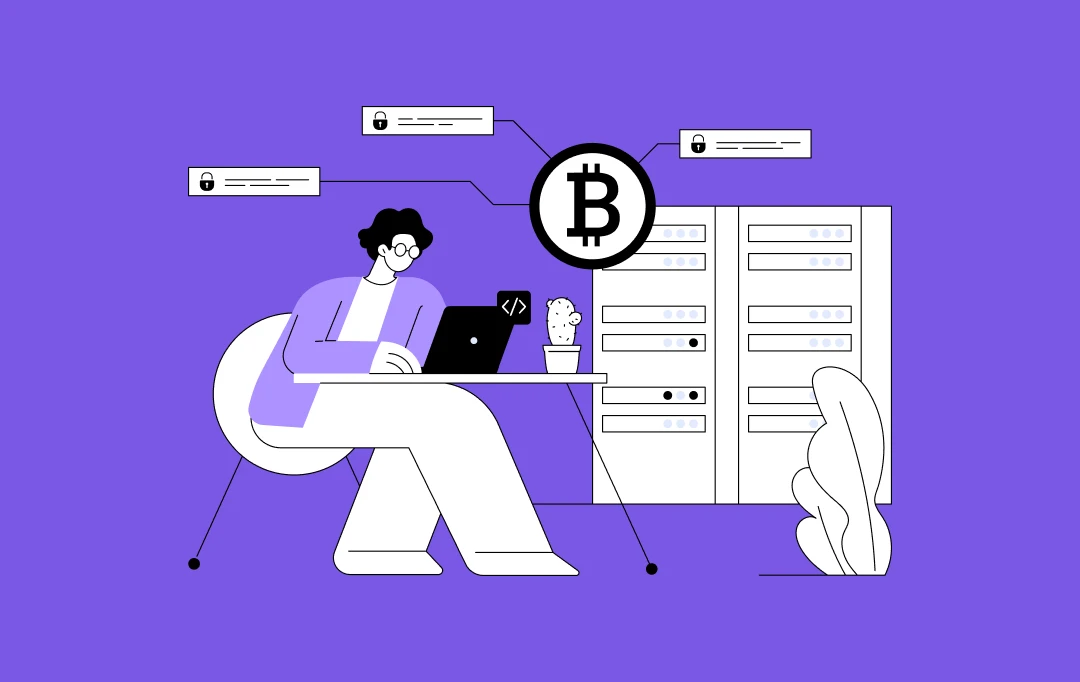
How Blockchain Integration Is Optimizing Business Processes in Dubai
Key takeaways: Blockchain is a strategic enabler in Dubai, transforming traditional business workflows by enhancing efficiency, transparency, and automation beyond cryptocurrency applications. Dubai’s supportive regulatory environment and government initiatives (e.g., VARA, Dubai Blockchain Strategy) create a clear, innovation-friendly framework, accelerating blockchain adoption. Integration with legacy systems through modular blockchain solutions enables enterprises to modernize operations…






